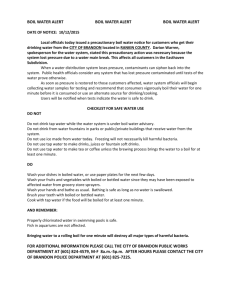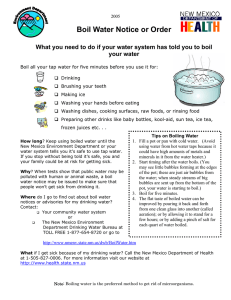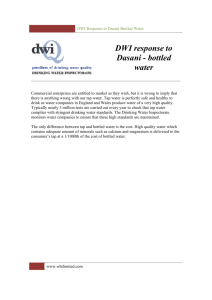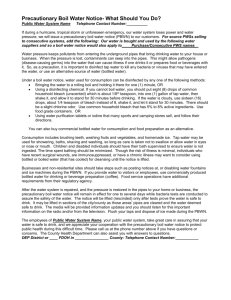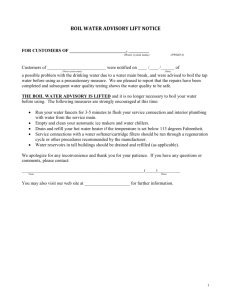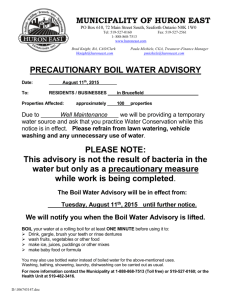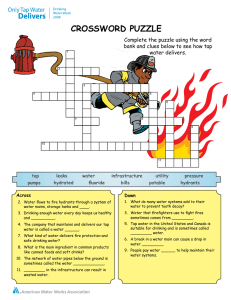Boil Water Order fact sheet - Massachusetts General Hospital
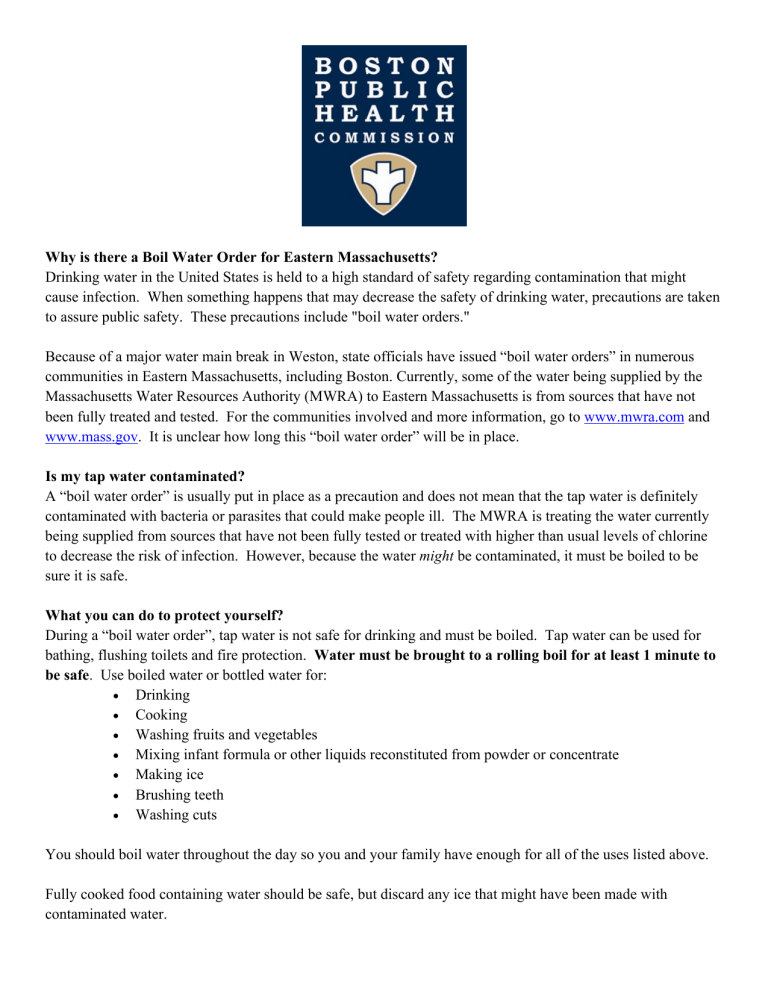
Why is there a Boil Water Order for Eastern Massachusetts?
Drinking water in the United States is held to a high standard of safety regarding contamination that might cause infection. When something happens that may decrease the safety of drinking water, precautions are taken to assure public safety. These precautions include "boil water orders."
Because of a major water main break in Weston, state officials have issued “boil water orders” in numerous communities in Eastern Massachusetts, including Boston. Currently, some of the water being supplied by the
Massachusetts Water Resources Authority (MWRA) to Eastern Massachusetts is from sources that have not been fully treated and tested. For the communities involved and more information, go to www.mwra.com
and www.mass.gov
. It is unclear how long this “boil water order” will be in place.
Is my tap water contaminated?
A “boil water order” is usually put in place as a precaution and does not mean that the tap water is definitely contaminated with bacteria or parasites that could make people ill. The MWRA is treating the water currently being supplied from sources that have not been fully tested or treated with higher than usual levels of chlorine to decrease the risk of infection. However, because the water might be contaminated, it must be boiled to be sure it is safe.
What you can do to protect yourself?
During a “boil water order”, tap water is not safe for drinking and must be boiled. Tap water can be used for bathing, flushing toilets and fire protection. Water must be brought to a rolling boil for at least 1 minute to be safe . Use boiled water or bottled water for:
• Drinking
• Cooking
• Washing fruits and vegetables
•
•
•
•
Mixing infant formula or other liquids reconstituted from powder or concentrate
Making ice
Brushing teeth
Washing cuts
You should boil water throughout the day so you and your family have enough for all of the uses listed above.
Fully cooked food containing water should be safe, but discard any ice that might have been made with contaminated water.
Can I use tap water for bathing?
Yes. It is safe to use tap water for bathing. Young children should be supervised so that they do not drink water in the shower or bathtub.
Can I use tap water for washing my hands?
You can wash your hands with soap and tap water, and completely dry them and then apply a hand sanitizer whenever possible. People at high risk of illness, such as those who are severely immune-compromised should either use boiled or bottled water with soap for hand washing or always follow hand washing with use of an alcohol based hand sanitizer. If hands are not covered with dirt, use of a hand sanitizer alone should be adequate for most people.
When preparing or eating foods, it is particularly important to wash with boiled or bottled water or use hand sanitizer after washing with tap water. Washing with tap water only should be avoided.
The following people should pay special attention to proper hand washing during a “boil water order” and should use an alcohol based hand sanitizer or boiled or bottled water and soap:
• Food preparers and handlers
• Health care workers
• People who care for those with conditions that lower their immunity to infections
Can I use tap water for brushing my teeth?
No. You should use boiled water or bottled water for brushing your teeth.
If I drink water that has not been boiled, can I get sick?
While many infectious organisms can get into drinking water, the parasites Cryptosporidium and Giardia , are of the most concern. The very young, the elderly, and people with conditions that lower their immunity to infection are at higher risk of infections and complications from these parasites. However, taking the recommended precautions will effectively prevent these infections.
How will I know if I get sick from the water?
It usually takes about 7 days for symptoms of Giardia or Cryptosporidium infection to appear. These symptoms include stomach cramps, nausea, and diarrhea. However, symptoms may develop a shorter or longer time after exposure. Infections due to other bacteria or parasites are less likely, but the symptoms would also be nausea, vomiting, cramps and diarrhea in 2 to 7 days after exposure. If you develop symptoms that might be due to exposure to contaminated water, you should contact your health care provider.
